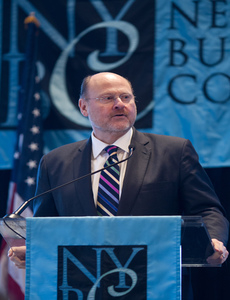
Former chairman and CEO of the Metropolitan Transportation Authority (MTA), Joseph Lhota used the New York Building Congress (NYBC) luncheon today, Jan. 14, in New York to formally announce his plans to run for mayor.
"I would not have left the MTA—a job and a position that I love—if I was not going to run for Mayor of New York," says Lhota, who resigned from the agency on Dec. 31, 2012.
Most of Lhota’s speech, however, focused on MTA’s restoration of the city’s 108-year-old transit system in the wake of Superstorm Sandy. “MTA is so much better than the reputation that it has,” Lhota says, adding that it is unfortunate that it took a tragedy to change public perception. The agency did not lose any rail stock or equipment during the storm, he adds.
Lhota credits what he calls "first-rate planning and great implementation" for MTA's ability to quickly restore the “circulatory system of the entire economy of New York City” in increments, with buses up and running in just seven hours and the subway in 36 hours after the storm. MTA was the first government agency to fill out Federal Emergency Management Agency (FEMA) forms and the first to get money, he says.
Sandy showed the city's vulnerability, Lhota says. Without the city's subway tunnels, the 14-ft surge of water that flooded the city’s tunnels would have instead flooded the city's streets and basements, he says. MTA has held three "after-action reviews" since the storm and will do even better in the event of another storm of this magnitude, he says. The city needs a better solution in the event of another storm but it does not need to "reinvent the wheel," he adds.
Meanwhile, NYBC’s current top priorities are storm preparedness and capital project support, says Richard Anderson, NYBC president.



